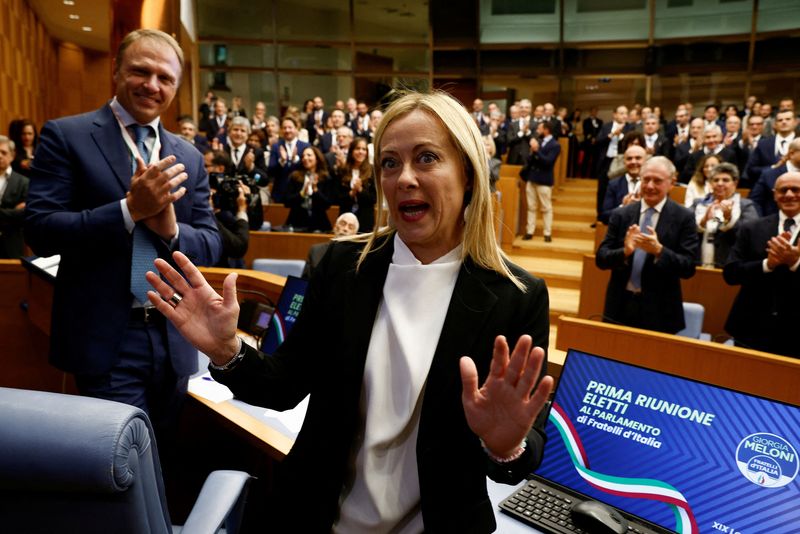By Giuseppe Fonte
ROME (Reuters) - Giorgia Meloni, expected to be named Italian prime minister this month, plans to increase government borrowing to soften the impact of sky-high energy prices, two sources close to the matter told Reuters.
Meloni, whose Brothers of Italy party led a right-wing alliance to victory at a Sept. 25 election, has said the energy crisis will be the first test for her government.
Hit by soaring electricity and gas bills and record high consumer prices, Italy is already in the early stages of a recession, with the Treasury forecasting three straight quarters of economic contraction.
Outgoing Prime Minister Mario Draghi has already set aside 66 billion euros ($64.92 billion) this year for tax breaks and subsidies to help energy-intensive firms and poor households.
Despite this, Treasury figures published last month showed the budget deficit is on track to come in well below targeted thanks to surging value added tax revenues and excise duties, meaning Meloni has some budget leeway to play with.
Asking not to named due to the sensitivity of the matter, the sources said Meloni would use this to the full by reinstating deficit targets set by Draghi in April.
Meloni's spokesperson declined to comment. In an interview with Reuters on Aug. 25, Meloni said she would respect European Union budget rules and not blow a hole in the country's finances.
Draghi's most recent aid measures are due to expire in November, and just extending them for another month would cost 4.7 billion euros, the Treasury had said.
Under an unchanged policy scenario set out in September, the Treasury sees the fiscal gap at 5.1% of gross domestic output (GDP) in 2022, sharply down from the April target of 5.6%, while the forecast for 2023 is cut to 3.4% from 3.9%.
Restoring the previous targets gives Meloni budget leeway of around 0.5% of GDP or around 10 billion euros both this year and next, the sources said.
Senior Meloni aides in the running for prominent cabinet posts have already started talks with Treasury officials to draft the new relief measures, one of the sources said.

Meanwhile, European Union countries are at odds over how to tackle the energy crisis, ahead of a key summit of their national leaders on Thursday and Friday.
($1 = 1.0167 euros)